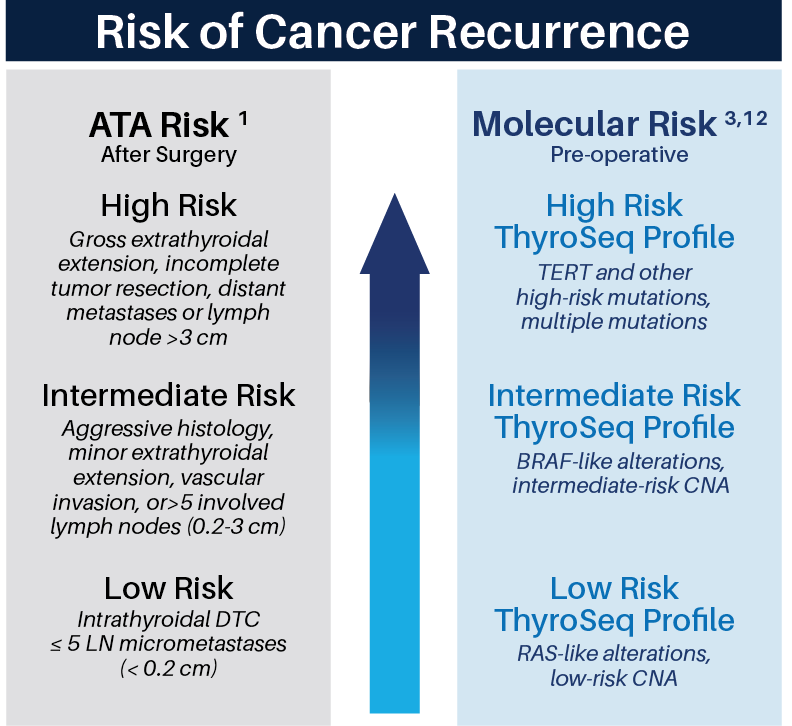What is ThyroSeq and how can it help patients?
ThyroSeq® Genomic Classifier (GC) is a molecular test specifically designed to determine if a thyroid nodule is benign (not cancer) or malignant (cancer) when cytology result is indeterminate.
ThyroSeq also provides specific information about the genetic makeup of the nodule which allows physicians to determine an individualized course of treatment.
If a ThyroSeq result is negative, the patient can likely avoid surgical removal of their thyroid. If the result is positive, ThyroSeq provides additional information that helps the physician select the most appropriate surgery, which may include preserving part of the patient’s thyroid, protecting natural thyroid function.
Patient Management Using ThyroSeq
ThyroSeq test results refine cancer probability in thyroid nodules with indeterminate cytology, informing the most appropriate management of these patients.
ThyroSeq Utility for Prognostication and Therapy
Comprehensive molecular profiling by ThyroSeq provides preoperative prognostication of cancerous nodules, informing the extent of surgery and therapeutic options
ThyroSeq provides:
Preoperative assessment of the Risk of Cancer Recurrence (RCR)
Detection of clinically actionable therapeutic targets
Therapeutic gene targets (variants and fusions) detectable by ThyroSeq
How does ThyroSeq work?
The ThyroSeq test was designed by expert physicians in the field of thyroid cancer. The test combines years of scientific and clinical experience to help personalize patient care.
The leading platform for comprehensive genotyping of thyroid nodules
Interrogates 112 genes for four main classes of molecular alterations
Utilizes a proprietary Genomic Classifier (GC) that relies on the algorithmic analysis of all detected genetic alterations to report the test result as Positive or Negative
Results include a specific probability of cancer, potential management, and risk of recurrence
Validated in the largest prospective, double-blind, multicenter study of any commercially available molecular thyroid test
Highest NPV and PPV among well validated tests
Reliable detection of all types of thyroid tumors including Hürthle cell cancer, medullary thyroid cancer, and parathyroid lesions
International Independent Experience Study of ThyroSeq
Chen T, et al. The Role of the ThyroSeq v3 Molecular Test in the Surgical Management of Thyroid Nodules in the Canadian Public Healthcare Setting. Thyroid. 2020. doi: 10.1089/thy.2019.0539.
Independent study of ThyroSeq v3 from McGill University of indeterminate (Bethesda III-IV) thyroid nodules
Results:
98% of samples sufficient for testing (51 nodules sampled, 1 was inadequate)
Even with a high pretest cancer prevalence at 40% in the study cohort, ThyroSeq had a high benign call rate of 58%
ThyroSeq allowed 54% of patients with indeterminate cytology to avoid surgery
Among 22 patients that had surgery:
All 19 positive samples were malignant, demonstrating a PPV of 100% for ThyroSeq-positive samples that went to surgery
2 currently negative samples were benign
iNDEPENDENT Real-world STUDY OF thyroseq
Desai D, et al. ThyroSeq v3 for Bethesda III and IV: An institutional experience. Thyroid. 2020. doi: 10.1002/cncy.22362
ThyroSeq benign call rate as per an independent study from the University of Pennsylvania
Independent study of ThyroSeq v3 from the University of Pennsylvania of 415 Bethesda III-IV thyroid nodules
Results:
ThyroSeq benign call rate was 71%
ThyroSeq had a high NPV of 98%; all missed cancers were ATA low risk
In test-positive nodules that went to surgery (n=127), ThyroSeq had a PPV of 68%
45 unique combinations of genetic alterations were detected, demonstrating the comprehensive and individualized results provided by ThyroSeq
The authors concluded that specific gene alteration results reported by ThyroSeq can help guide patient management and that ThyroSeq’s high benign call rate is valuable in avoiding unnecessary surgeries in most patients and improving patient quality of life.
How can I order ThyroSeq testing?
ThyroSeq testing is performed on an FNA biopsy, either freshly collected during an FNA procedure or on a previously made FNA cytology smear. Cell block and FFPE surgical tissue slides are also acceptable for ThyroSeq testing.
To set up ThyroSeq testing, please fill out the form. We will get back to you as soon as possible.
I understand that by checking the Consent box, I agree to UPMC’s EU Privacy Notice.
“To all at UPMC I cannot thank you enough for this truly impressive and indispensable tool called ThyroSeq. I urge all those presented with an indeterminate thyroid nodule result to not accept this ‘surgery to see’ and instead have your health ‘secured by science’ as ThyroSeq has so plainly proven for my daughter.”







